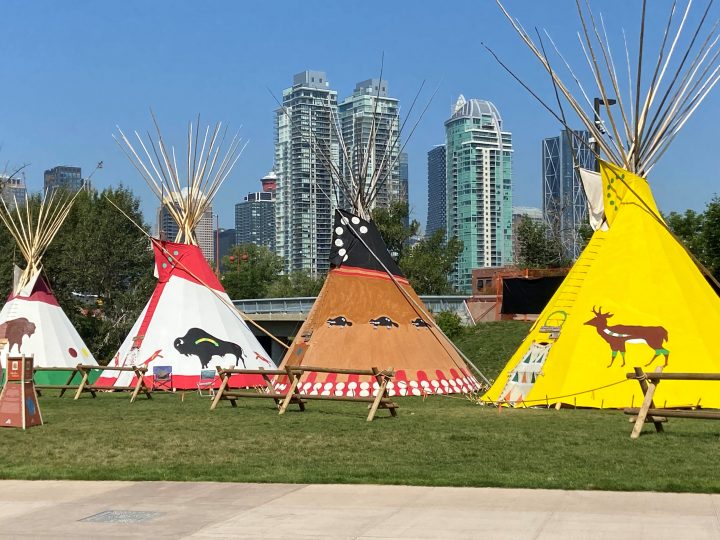Teepee holders at Elbow River Camp are happy to be back again after COVID-19 put the brakes on the Calgary Stampede last year.

It’s quieter this year. Normally there are 26 teepees at the site, which showcases the cultures of the Siksika, Piikani, Kainai, Tsuut’ina and Stoney Nakoda First Nations. This year, 18 families are participating.
The flags at Elbow River Camp are at half mast this year, as a tribute to the recently discovered unmarked graves at former Canadian residential schools.
David Bearspaw’s grandfather was first invited to join the Calgary Stampede in 1912 as a way to showcase Indigenous culture at the then-new event.
“Back then, they were forbidden to practice our traditions. It was considered evil… Here, we were able to showcase and present our culture. It seemed like it was allowed at that time, only for that period,” Bearspaw said.
Bearspaw, a member of the Stoney Nakoda First Nation, said more local visitors are stopping in at Elbow River Camp this year, many of whom say this is the first time they’ve come to that part of the park.
“The visitors that come through are fascinated. They really enjoy it,” Bearspaw said.
He hopes recent recoveries of remains at residentials schools are creating more awareness of Indigenous culture.
“Maybe they are now opening their eyes. Maybe they are now starting to listen. Maybe they have come to realize the time has come.”
Noran Calf Robe, a Siksika teepee holder, is also continuing the tradition started by his grandfather.
“Our goal is to teach the culture and traditions the right way. There’s no Hollywood stuff here,” Calf Robe said.
He enjoys taking questions from people all over the world as he welcomes them to his teepee, but says the subject of residential schools is personal.
“It hurts them. It brings back memories to a lot of people — what happened when they went to residential schools. You don’t ask them and bug them all the time. If they want to tell you about it, they will,” Calf Robe said.
As Bearspaw continues the tradition of inviting people to know Stoney Nakoda culture, he hopes people will finally listen to what Indigenous people have been saying for years.
“For us it was always there. We’ve always been wanting to speak. At some point, we spoke but it goes in one ear and it goes out the other. Now something’s happening,” Bearspaw said.
“They (visitors) are here to experience and see first-hand the very rich Indigenous culture that is still here and was always here. They are just now maybe realizing that we need to talk. We need to experience and see what it’s like and hear,” Bearspaw said.
Because of COVID-19 restrictions, visitors won’t be allowed to enter teepees this year. Daily powwow demonstrations are held at Elbow River Camp from noon to 1:30 p.m., but competitions are not being held.





Comments